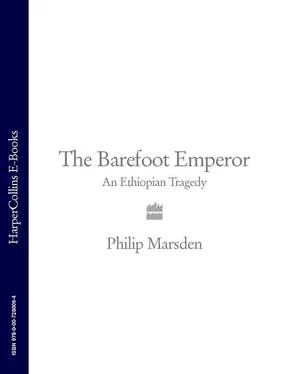Whenever he was able during those years, Plowden travelled up into Ethiopia. There he breathed the mountain air, climbed beneath a puff-clouded sky to ridges where you could gaze for a hundred miles or more. He bathed in bracing streams, slept easily in the cool nights. He visited John Bell, hoping to hear that the rebels were on the run, that Ras Ali was victorious and that he might at last take up residence in the highlands.
In 1850, Ras Ali suddenly made headway. Two of his greatest enemies – Dejazmaches Kasa and Wube – fell into line behind him. When he called them to campaign on his behalf, they came running. They brought their thousands of followers. A strange peace began to settle over the country, and many believed that the years of the Mesafint might just be over.
But in January 1853 Plowden wrote to his masters in the Foreign Office: ‘One of the great vassals of Ras Ali named Dejazmach Kasa … has rebelled.’ He reassured them that ‘at present the position and power of the Ras will be in no wise endangered’.
Four months later, he reported: ‘This rebel chief has gained another decisive victory over the combined forces of Ras Ali and Dejazmach Wube.’
Two months later: ‘Dejazmach Kasa is increasing in force.’
Three days later: ‘Dejazmach Kasa has completely defeated Ras Ali.’
The tufty-cheeked mandarins of the Foreign Office were not impressed. All they’d ever heard from their consul to Ethiopia was bad news from the interior and endless squabbles with the Turkish pasha .
‘Her Majesty’s government,’ wrote the permanent secretary, ‘were led by the representations made by you to expect that advantage would result to British interests from the conclusion of a treaty with the Rulers of Abyssinia … It appears however with your reports now before me, that there is little reason to expect such will be the case.’
Plowden was forced to agree. On 10 July 1854, six years after his original appointment as consul, he asked for his first leave.
Yet even as he was waiting, a new possibility emerged. As more news came in about Kasa, Plowden began the same volte-face that others had already performed in the highlands. Dejazmach Kasa, the wrecker of peace, was becoming the bringer of peace. Plowden delayed his departure.
On 3 March 1855 he wrote to tell Lord Clarendon that Dejazmach Kasa had defeated his last enemy, Dejazmach Wube. ‘There is at last some chance that Abyssinia may be united under one Sovereign, and such an one as shall merit the support and friendship of Her Majesty’s Government.’ The more Plowden heard of the new ruler, the more excited he became. Dejazmach Kasa had already abolished the slave trade, spoken out against battlefield mutilations. He had written to Plowden himself expressing his interest in ‘a sincere friendship with Europeans, more especially the English government’. When news reached him that Kasa had been crowned, Plowden was elated. He cancelled his leave and prepared to travel inland. He had waited nearly a decade for an opportunity like this. The Ethiopians had waited rather longer, and the promise of liberal reforms and foreign relations meant less to them than Kasa’s choice of name. He had been crowned Tewodros II.
5
How Kasa Haylu rose to become Tewodros II is a tale so often told in the villages and highlands of Ethiopia that the details have become stretched, added to and reshaped to make them fit a grander pattern. Even during his own lifetime they began to take on the form of more familiar tales, those of ancient folk heroes, of saints or the giants of the Old Testament. In particular his chronicles tell a story similar in many ways to the early life of the greatest of all kings, the father of Solomon – King David.
It was King David who had achieved what Ethiopian Christians longed for: he brought to an end the Zemene Mesafint . His story and the psalms attributed to him were a touchstone for educated Ethiopians who had all learnt by heart their ‘ Dawit ’, the psalms of David. As a boy Kasa completed his Dawit with great speed. In later years it was the story of David and the beauty of his psalms that he turned to in times of reflection and need. Those who met him said he carried a copy of the psalms wherever he went, and were struck by his command of them. Henry Dufton, who came to Ethiopia in the early 1860s, concluded that ‘he took for a standard – a model to which he could conform himself – his illustrious progenitor, King David’.
The strange thing is that many of the confirmed facts of Kasa’s early life really do fit with the young David, as did the physical prowess, the military skills and the intensely human virtues and flaws that shaped each of their reigns.
Like David, Kasa emerged not from the royal court, but from provincial obscurity. He was born in about 1820. His father was Dejazmach Haylu Welde Giyorgis, who died when Kasa was young. The truth about his mother troubled him all his life. His enemies taunted him with accusations that she was a camp-follower, a woman who had simply slipped into Haylu’s tent. They said she sold koso , a much-used purgative, on the street corners of Gondar. To others she was a noblewoman of astonishing beauty. Either way, it was she, Atitegeb, who ensured that he received many years of Church schooling. In biblical matters he could outquote many of the European missionaries who came to the country. He became proficient in Arabic.
He was still a boy, studying at the monastery of Mahbere Selassie when it was attacked by a warlord. The novices were slaughtered or castrated, but Kasa fled unharmed. He joined that nameless tribe of outlaws who haunted the remoter hills of the kingdom. He lived in caves, off the berries of the forest.
Then David departed and came into the forest of Hareth .
His strength with the spear, his skills as horseman, his courage and luck attracted others around him. He was little more than twelve years old. Sometimes he and his band would rob a caravan, or ambush the soldiers of the hated Oromo, and then he divided the spoils as David had divided the spoils of the Amalekites.
And when David came to Ziklag he sent of the spoil unto the elders of Judah, even to his friends, saying, Behold a present for you the spoil of the enemies of the Lord .
The years passed. Kasa fought in the lowlands to the west. The number of his victories grew so quickly and with such mysterious ease that Kasa began to see them as part of a plan devised by God. Then a great drought came and famine swept through the highlands, and Ras Ali and his mother Empress Menen could do nothing for the people. Out of the wilderness rode Kasa and his men with looted grain. Kasa gave the people money to buy tools, and he himself helped cut back the forest to plant grain. He showed them how to make the wild places green.
And every one that was in distress, and every one that was in debt, and every one that was discontented, gathered themselves unto him; and he became a captain over them .
In Gondar, Ras Ali’s mother, Empress Menen, saw the rise of Kasa and despatched an army to defeat him. It was too late. When her men came upon him, such was his reputation that they fled with hardly a fight.
Then Menen and Ras Ali and the Oromo chiefs became angry. Kasa’s support among the people was greater than theirs. They summoned him, that he might make an alliance with them.
And the princes of the Philistines were wroth with him; and the princes of the Philistines said unto him, make this fellow return, that he may go again to his place which thou hast appointed him, and let him not go down to battle, lest in the battle he be an adversary to us .
Читать дальше












